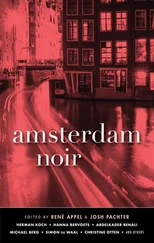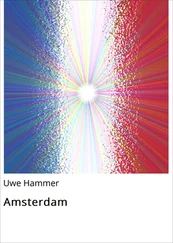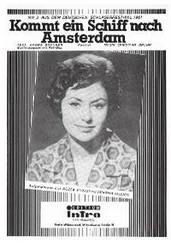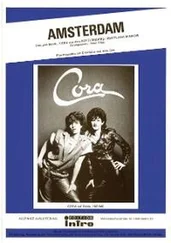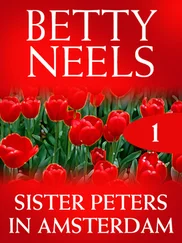Bekker wanted me to tell him where this was heading, it couldn’t go on like this. And it didn’t either. After summer vacation she never came back.
“Girls,” Bekker said, “they’re not worth it…. She had a spring in her step when she walked.” He turned the lamp up a bit and turned the page in the book he was reading. “Where do you think she is now? Do you think she’s kissing someone?” A little spark fell from his pipe onto the book. He put it out with his matchbox. “Damn, a hole, that was stupid.” “It’s better this way, girls aren’t worth it, they don’t get you anywhere, they only distract you. They’re pretty at a distance, to write poems about.”
He read. After a short pause he looked up again…. “You know what the strange thing is? When she caught up to me that afternoon she walked past me, right next to me. She only just missed me. There was so to speak nothing separating us, a little clothing on her and practically none on me.” (Bekker went around summer and winter with only an overshirt covering his bare chest.) “That’s not much, you know?” I said it wasn’t much — there was a lot more between the Naarden tower and Bekker’s room, for example. “Between the Naarden tower and this mustache,” Bekker said, “is much less, much less, than there was between her shoulder and mine that day. No comparison, Koekebakker.” He turned another page, looked into the light, and said “That’s how it is,” and went on with his reading.
V
And so it was: God showed his face and then hid it again. You never got anywhere, especially if you only looked at the girls from a distance and let other men kiss their pretty faces, the important gentlemen they as a rule liked a whole lot more than us. They were so much more respectable and spoke so well. And we were bums.
There was nothing to hope for from God — who goes his own way and gives no explanations. If there was something we wanted we had to take care of it ourselves. But we realized that it was easy for Bavink and Hoyer to talk, they had talent, they could really accomplish something in the world, but we — Bekker and Kees and me — the only difference we’d ever make was as socialists and it did seem a bit weak, after sitting at God’s table, to address envelopes or join the Kastanjeplein Neighborhood Association. And nothing came of life on the heath either, because even when Bekker did get a little money his shoes needed repairing. Maybe we could join Van Eeden’s commune, but when we walked out to Bussum one Sunday, four hours on foot, we saw a man strolling around in a peasant smock and expensive yellow shoes, eating sponge cakes out of a paper bag, hatless, in inner harmony with nature as people used to say back then, with crumbs in his beard. We couldn’t bring ourselves to keep going, we turned right around and walked back to Amsterdam, walked along the Naarder canal in single file, singing, and a farm girl said to a farm boy, “There wasnt nothin about it in the paper, inn’t that some-thin? D’you know about that?”
VI
So we didn’t do anything. No, actually, that was when Bekker wrote his first poem.
I still remember it perfectly, it was on a Sunday, of course, because whenever anything happened it was on a Sunday. The other six days a week we spent dragging our chains around from nine to six.
I was out looking for a job in Hillegom, a job with a bulb dealer with fat red clean-shaven cheeks. The others decided right away to make a day of it. Bavink, Hoyer, and Bekker had all said so many times that they wanted to go to the Museum of Antiquities in Leiden, this was the day. Kees had to come too, he did whatever the others did. I was going to meet them in Leiden.
It was in December. I stood in the back of the tram, all the way in the back. It drove through the country and stopped and started again, it took hours, the countryside was endless. And the sky got bluer and bluer and the sun shone until it seemed like flowers would have to start sprouting out of the country bumpkins. And the red roofs in the villages and the black trees and the fields, most of them covered with straw, had it nice and warm, and the dunes sat bare-headed in the sun. And the road lay there, white and smarting, it couldn’t bear the sunlight, and the glass panes of the village streetlamps flashed, they had trouble withstanding the glare too.
But I got colder and colder. And the tram ran as long as the sun shone. It’s a long ride from Hillegom to Leiden and the days are short in December. By the end, a block of ice was standing there on the tram staring into the big stupid cold sun that was flaming red as though the revolution was finally starting, as though offices were being blown up all over Amsterdam, but still it couldn’t bring a spark of life back to my cold feet and stiff legs. And it kept getting bigger and colder, the sun, and I got colder and stayed the same size, and the blue sky looked down very disapprovingly: What are you doing on that tram?
Bekker wrote his first poem that afternoon. When I got to Leiden, as they were lighting the gas lamps, and I found the immortals sitting in a row on a long bench in the third-class waiting room at the train station, near the stove, it was my turn to undergo the poem. It was beautiful. No title? Bekker shook his head. But Bavink and Hoyer shrieked that they’d seen something written at the top. A well-dressed gentleman said “Louts” to the man who punched his ticket at the door. Bavink snatched the sheet of paper out of Bekker’s hands. What was written at the top? Was it even a question? “To her.” Just what I would have guessed.
Bavink thought the stove could use more coal but he couldn’t find the scoop. They always take the scoop out of the waiting rooms, otherwise the public uses too much coal.
So Bavink tossed lumps of coal into the stove with his bare hands, and got into an argument with a guy in a white smock.
It was fun that night. Kees and Hoyer fell asleep on the train. Bavink chatted with a girl from The Hague and inhaled the smell of heliotropes given off by her dear little frame.
Then Bekker started talking about the heath again. How he wanted to live there in peace and wait and see what God had planned for him. And not have to do anything. He was deeply melancholy. I had an objection to the heath: it’s so dry out there. And I asked Bekker what exactly he planned to live on, office workers don’t usually do too well on the farm, except in America (we believed all kinds of lies about America). But he wasn’t worried about that. He didn’t need anything.
Now he knows better. Only God doesn’t need anything. That is precisely the fundamental difference between God and us.
So life on the heath came to nothing too.
VII
Four of us sat in the fine white sand at the foot of the dunes in Zandvoort and looked out at the ocean. Kees wasn’t there. It was late July. The sun was still high above the ocean at seven o’clock and it made, again, I can’t help it, it’s God himself who keeps repeating himself, it again made a long golden stripe in the water and shone in our faces.
A tugboat was puffing on the horizon. It rose and sank; when it sank we could only see the steam pipe.
Bekker was going to Germany the next day. His knowledge of languages had gotten him a job as a clerk in a factory handling foreign correspondence. And Hoyer was off to Paris, to paint.
Bekker in particular was deeply melancholy again. He wished he had never taken that job. He couldn’t understand why he’d done it. He was in that miserable factory town for two hours, for the interview, and got sick, homesick. He fled back to the train station as fast as he could. The rails still lay there, luckily running straight to the horizon and beyond, back to Amsterdam. He had already bought his ticket, and on it was clearly printed, right there: “To Amsterdam.” And the train came on time and carried him home along the rails, and when he got off at Centraal Station his heart was so full of emotion that he struck up a conversation with the engineer and gave him a cigar, an expensive cigar, and even stroked the locomotive with his hand and thought: “Ahh, nice locomotive.” And then he took the job anyway. It brought in a lot more money than he was making here. Now he had to go away and not see the ring of dikes around the city again. All that time the rails would be lying there, but he would only be able to go stand on the platform and watch the trains pull out in the evening, and all day Sundays, many times a day.
Читать дальше
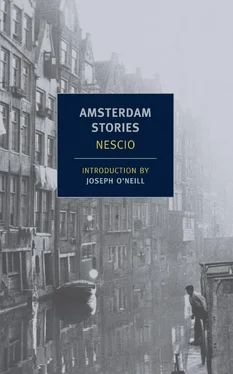


![Олеся Проглядова - Nomen nescio. Имя неизвестно [litres]](/books/391740/olesya-proglyadova-nomen-nescio-imya-neizvestno-lit-thumb.webp)
